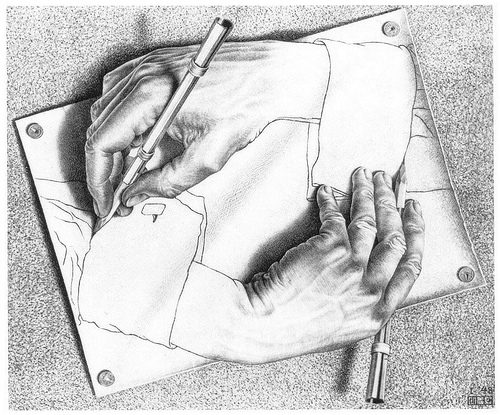Is the future of quality evolutionary or revolutionary?
Bill Troy asked just that to the Influential Voices gang.
AUTOPOIESIS AND THE EVOLUTION OF QUALITY
In the book The Tree of Knowledge biologists Humberto Maturana and Francisco Varela introduced the concept of Autopoiesis, which describes how successful systems are capable of reproducing and maintaining themselves. I found the concept fascinating and applicable beyond the biology realm. I see a clear resemblance with organizations, societies and cultures. When an autopoietic entity interacts with its environment, the interaction depends on how the entity (or system) sees the environment and not in any way in the environment itself. According to Maturana and Varela “The being and doing of an autopoietic unity are inseparable, and this is their specific mode of organization.” Just as in the famous “Drawing Hands” (M.C. Escher), the drawing draws itself. Interactions result in adaptation and thus we get to our definition of evolution: “evolution is a natural drift, a product of the conservation of autopoiesis and adaptation”.
We quality professionals surely are the basic units of an autopoietic system. Quality has remained basically the same in its essence through its history, but it keeps adapting to include new and more powerful tools to its already extensive toolbox. Take the autopoietic entity Edwin Garro, I started with quality control and TQM (and the emphasis on the human aspects of quality), then evolved to statistics, quality management systems, six sigma, lean, lean-six Sigma, reliability, and more statistics. Currently my adaptation is taking me to risk management, BPM, multivariate statistics, back to the human and leadership aspects of quality, and the constant feeling that I just started my learning.
But being autopoietic only means that we are capable of creating more “quality stuff”. So evolution is needed but is not enough.
ALLOPOIESIS AND THE REVOLUTION OF QUALITY
“Allopoieitic systems are organizationally open. They produce something different than themselves”. A car manufacturer is an example of allopoiesis, the network of production machines and processes don’t produce more production machines; they produce something different than themselves, in this case, cars.
So, it is great that we keep adding tools to our quality toolbox (autopoiesis), but they have meaning only if they produce better products and services (allopoiesis). Better consumer products and services are certainly a good place to use our techniques, but we can go farther and apply our trade to better education, better health care, better housing to millions of people around the world.
These areas need to improve their management systems and learn to pursue excellence. Government is a logical extension of these same areas; old style TQM could provide the much-needed quality leadership awakening top government officials seem to lack.

We need to keep evolving, that is the only way we will be ready to do our part in the many quality revolutions that await us out there.


